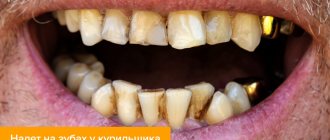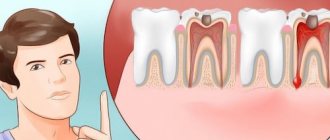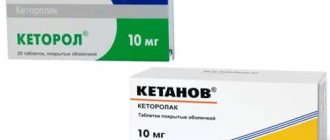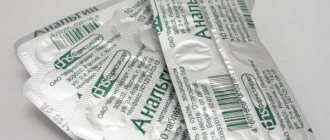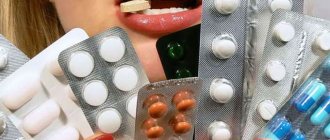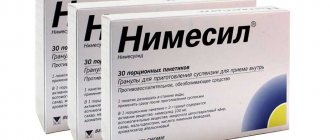Destruction of the tissues that form the crown and root parts of the tooth invariably leads to discomfort, and in more advanced cases – to acute, throbbing or nagging pain. In dentistry, toothache has a special definition – dentalgia or odontalgia. Often the cause of pain can be gum disease, jaw problems, or injuries. Unfortunately, it is not always possible to get an appointment with a dentist at the first signs of discomfort, so you can use tablets for toothache to relieve symptoms and improve your well-being.
It is important to understand that not a single tablet can eliminate the cause of toothache. The only way to cope with dentalgia for a long time is to consult a dentist for therapeutic or surgical treatment.
The choice of a particular treatment method depends on the complexity of the problem and the stage of its development.
By clicking the “request a call” button you agree to the personal data processing policy.
Modern pharmacology offers a wide range of effective drugs that can reduce discomfort caused by progressive dental diseases or injuries. Today, you can buy a variety of medications for toothache in pharmacies. Conventionally, they can be divided into 3 groups:
- NSAIDs (non-steroidal anti-inflammatory drugs)
. As a rule, the source of toothache is an inflammatory process. NSAIDs don't just relieve pain - they relieve inflammation, thereby reducing pain. - Analgesics.
They do not affect the course of the inflammatory process - they eliminate the source of pain by affecting the nerve endings and pain centers in the brain. - Local painkillers
. These are drugs such as lidocaine and novocaine. As a rule, these products are produced in the form of injections, but you can find small aerosol cans with lidocaine on sale - one press and the pain goes away for 30-40 minutes. The main disadvantage of local anesthetics is their strong effect on nearby tissues, which can result in a “cotton tongue” effect, temporary loss of skin sensitivity at the site of exposure, and lack of taste sensations.
As a rule, tablets are the most popular - they are easy to use, and if you choose the right drug, you can use them not only to relieve toothache, but also as an antipyretic, a medicine for migraines, joint pain, etc.
Other medications for toothache
In addition to tablets and capsules, the pharmaceutical industry offers a lot of other drug options that help in the fight against dentalgia:
- Gels.
They are most often used in children during teething. Moreover, such remedies also have an effect in adults during the eruption of wisdom teeth. Among the most popular drugs of this kind are ointments and gels “Cholisal”, “Solcoseryl”, “Dentol”, “Kamistad”, “Metrogil Denta”. - Dental drops.
These are safe, natural preparations made on the basis of natural ingredients, extracts, and essential oils. They have a local anti-inflammatory, calming and analgesic effect. Popular drops - “Dentaguttal”, “Dentinox”, “Dantinorm”, “Denta” - Injections.
These may be conventional drugs for intramuscular administration (Ketonal, Ketorol, Diclofenac), or they may be drugs for point application. Most often, injections are used by professionals for strong pain relief before tooth extraction or treatment (Ultracain, Septodont). - Antibiotics.
It is important to understand here that if a tooth hurts due to the development of caries or pulpitis, then antibiotics are useless (after all, they do not have any effect on the exposed nerve). But if there is a suspicion of the formation of an abscess under the root (obvious inflammation), then it makes sense to take a course of antibiotics (amoxicillin, clindomycin, metronidazole, chloramphenicol, biseptol) for maximum resorption of the accumulated pus. Of course, immediately after this you need to go to your doctor and eliminate the root cause of the pain (treat or remove the tooth). Antibiotics are available in the form of tablets, ointments, and injections. - Sprays and aerosols.
These medications have a local anesthetic effect; simply put, they freeze the tooth. The most popular is Ledocaine spray.
Folk remedies:
- Rinses
Most often, a saline or soda solution is used (1 teaspoon per glass of water), to which you can add a couple of drops of iodine. You can rinse a sore tooth when the first pain appears. - A decoction of sage, chamomile, and St. John's wort for rinsing is also recommended. It is quite simple to prepare: pour boiling water over 1 teaspoon of any of the above herbs, hold in a water bath for 15-20 minutes, strain and cool slightly. Rinsing is carried out as needed to relieve pain with a warm decoction.
- Cooling
. For local anesthesia, you can temporarily apply a piece of ice or something cold to the painful tooth (or rather, to the cheek on the painful side). As a rule, the effect occurs quickly, but does not last long. The main disadvantage of this method is that after applying ice, the pain may disappear for a while, and then return with renewed vigor. - Garlic applications
. Oddly enough, you need to apply garlic not to the tooth, but to the hand (in the place where the pulse is usually felt). The garlic is cut into small cubes or pressed through the garlic, a piece of bandage is placed on the wrist (if this is not done, there is a high risk of a chemical burn from contact of garlic juice with the skin), folded in half or three times, garlic is laid on the bandage, covered with two or three layers of bandage on top. and secure the application. If you have a toothache on the right side, then apply the garlic to your left hand and vice versa.
You can find even more traditional methods in this article.
When a person starts to have a toothache, he is ready to use any means to make it end as soon as possible. Some patients, in the fight against dentalgia, use homeopathic remedies, which, in theory, are designed to cope with the disease. In fact, this makes very little sense: toothache is not a disease, but a symptom of it that needs to be quickly relieved. Homeopathic medicines are intended for long-term treatment, so instead of wasting time and money on useless medicines, it is better to take a tablet of a good painkiller and see a dentist as soon as possible.
The most popular painkillers for toothache
The list of pharmaceutical developments that effectively cope with negative dental symptoms can include those that contain:
- nimesulide;
- ketoprofen;
- ketorolac;
- dexketoprofen;
- flupirtine;
- mebeverine;
- ibuprofen;
- paracetamol.
Medicines based on nimesulide
This substance belongs to the class of NSAIDs and is recognized as a high-quality analgesic. But it should be used with caution for dental problems, as disturbances in the gastrointestinal tract, allergic and anaphylactoid reactions, swelling, urinary retention, shortness of breath, bronchospasm, and decreased visual acuity are possible.
Nimesulide is prohibited for treatment by children under twelve years of age, persons with bronchial asthma, stomach ulcers, Crohn's disease, and severe renal failure. It is also not suitable for pregnant and lactating women, alcohol and drug addicts.
Products with ketoprofen
Representative of the NSAID group. Shows anti-inflammatory properties. It is produced in the form of tablets, capsules, suppositories, solution for intramuscular and intravenous administration. The compound copes well with acute pain caused by deep caries and pulpitis. But patients with DU, kidney and liver pathologies, and blood clotting disorders should avoid using it.
The age limit for using ketoprofen is 18 years. It is also contraindicated for expectant and nursing mothers.
Drugs whose active substance is ketorolac
They perfectly relieve pain symptoms in diseases of the oral cavity and have a moderate antipyretic effect. The list of contraindications for use includes:
- hypovolemia;
- erosive and ulcerative lesions of the gastrointestinal tract during exacerbation;
- inflammatory bowel pathologies;
- severe kidney failure;
- hypocoagulation;
- kidney diseases.
Patients under 16 years of age cannot be treated with ketorolac.
Medicines including dexketoprofen
Dispensed strictly according to a doctor's prescription. Contraindicated for pregnant women, lactating women, people with diseases of the stomach and intestines, and a tendency to bleeding.
Most often dexketoprofen is well tolerated by patients, but sometimes causes arterial hypertension, skin rashes, bronchospasm, and erosive and ulcerative lesions of the gastrointestinal tract.
Medicines containing flupirtine
These are strong painkillers that fall into the category of centrally acting non-opioid analgesics. They help quickly cope with moderate discomfort in adults. Effective for negative symptoms caused by:
- voluminous carious cavity;
- inflammation of the neurovascular bundle;
- gingivitis;
- stomatitis;
- periodontitis.
Contraindicated for liver disease, alcoholism, elevated levels of liver enzymes, ringing in the ears, and under the age of eighteen. You should not take medications with flupirtine for a long time, as they put a lot of stress on the liver.
Products containing mebeverine
Mebeverine is a myotropic antispasmodic . It prevents the contraction of muscle fibers and eliminates painful spasms. Not suitable for children under 12 years of age.
The product should not be used if you are hypersensitive to any of its components. In general, it has a high safety profile and can even be used by pregnant women (in cases where the expected benefit to the mother outweighs the potential risk to the fetus).
Medicines containing ibuprofen
This active substance can be found in the formulations of Nurofen, MIG, etc. It belongs to the non-steroidal anti-inflammatory drugs. Available in pharmacies without a prescription.
Ibuprofen is very often used for dental pathologies . This is due to the fact that it can be found in everyone’s home medicine cabinet (it is kept there as an antipyretic). The product copes well with pain symptoms of moderate severity. The analgesic effect it provides lasts about seven hours. Effectively relieves inflammation.
But ibuprofen should not be taken if you have stomach problems. It greatly irritates the mucous membranes of the organ, which can aggravate the course of gastric pathology.
Products containing paracetamol
These are the most accessible analgesics and antipyretics. They fight well with moderate painful symptoms. If we compare paracetamol with more popular analogues, it has much fewer side effects. Therefore, it is permissible to use it in the treatment of young children. It can also be taken by nursing and pregnant women.
What to do if the pills don't help?
It often happens that even after taking strong painkillers, toothache does not subside. This happens for many reasons: advanced caries, pulpitis, severe destruction of the crown, abscess on the root (by the way, practice shows that in this case even local anesthetic injections such as Ultracaine are ineffective). In addition, do not forget about individuality - there are people who are simply not susceptible to the effects of drugs. Also, drugs that affect the nervous system and brain pain centers may not be effective in patients who are in a constant state of stress.
If no pharmaceuticals or folk remedies help, you should not look for a magic pill - you must urgently go to a dental clinic for qualified help.
Paracetamol for pregnant women
Already at the stage of pregnancy planning, it is necessary to undergo a full examination. This is known to any woman who has decided to become a mother. Among the specialists whose visits are necessary is the dentist. After all, during pregnancy, most women complain of dental problems.
The reason for this is hormonal changes in the mother’s body and the growth of the fetus, which needs vitamins and minerals. As a result, pregnant women may experience toothaches.
During pregnancy, it is safest to use lotions and rinses prepared according to traditional medicine recipes for toothache. However, even folk remedies during pregnancy should not be overused. After all, sometimes even safe herbal preparations can harm the mother and fetus, causing an allergic reaction.
Moreover, among dental pain relievers, gynecologists prefer paracetamol, since it acts directly on the source of pain without affecting other organs. In addition, it is able to pass through the placenta without adversely affecting the fetus.
Taking the drug during pregnancy should be minimized, since long-term use can still negatively affect the development of the child. In general, you should avoid taking any medications during the first trimester of pregnancy. It is at this time that the main systems of the baby’s body are formed.
Any medicine at this stage can harm the fetus. Of course, taking one tablet of paracetamol will not hurt, but with frequent use of the drug, the risk of developing negative consequences greatly increases.
Contraindications include diseases of the stomach and intestines, liver and kidneys, and bronchial asthma. Only a doctor can prescribe a pain reliever with the fewest side effects.
During pregnancy, teeth can be removed and treated. When treating, if necessary, the doctor will use the least harmful anesthetic drugs.
If seeing a doctor is not possible, you are allowed to take a minimum dose of the medicine. In addition, during pregnancy it is recommended to make an appointment with a dentist for a preventive examination.
Paracetamol is an excellent remedy for toothache and all other pain syndromes, but it is best used as a one-time drug.
Taking paracetamol is recommended only in case of urgent need. It is a one-time remedy for use as an antipyretic and pain reliever. However, at the first opportunity you need to see a specialist.
How often can you take painkillers?
Whatever the cause of toothache, you should never abuse painkillers:
There is no universal recipe for taking painkillers for toothache. Each drug is accompanied by instructions that clearly describe the dosage and method of use depending on the nature of the pain, age, weight of the patient, etc.
If we summarize all the recommendations, we can say that taking more than 3-4 tablets a day is not recommended (while strong tablets, such as Nise or Ketanov, it is generally better to take no more than 2 times a day).
Weaker drugs can be taken in larger dosages (1-2 tablets at a time, 3-4 times a day). But, again, if the pain is severe and you have to swallow 8 Paracetamol tablets to cope with it, it is better to take 1-2 tablets of Aertal or Nurofen - the effect will be approximately the same.
Content:
- Types of tablets for toothache
- The most popular painkillers for toothache 2.1. Medicines based on nimesulide 2.2. Products containing ketoprofen 2.3. Preparations whose active substance is ketorolac 2.4. Medicines including dexketoprofen 2.5. Medicines containing flupirtine 2.6. Products containing mebeverine 2.7. Medicines containing ibuprofen 2.8. Products containing paracetamol
- When is it okay to use painkillers?
If a tooth aches, it’s difficult to distract yourself from it. The physical discomfort associated with this deprives a person of the opportunity to lead a normal life and forces him to take various medications. Often, to relieve toothache , people take strong drugs for a long time.
It is clear that this approach to the problem cannot be called correct. If there is a need to use a painkiller, then there is a serious dental problem. It needs to be eliminated. Making an appointment with a dentist is the best solution in such a situation. There is no need to look for which pills can help for a long time. Medicines only remove negative symptoms, but do not cure the disease itself. By postponing therapy until later, you can face severe complications and even edentia.
Pregnancy pills
Pregnancy is the period when a woman should treat herself with the most care and carefully monitor her health - because the condition of her unborn baby directly depends on this. Therefore, even at the planning stage of pregnancy or at its earliest stages, it is necessary to solve all existing problems in the oral cavity. If for some reason this was not possible, you should prepare for the fact that coping with the resulting toothache will be very problematic:
- During pregnancy, and especially in the first and third trimester, it is prohibited to take any highly effective painkillers (it has been scientifically proven that active substances can penetrate the placenta, causing harm to the unformed body of the unborn baby).
- Hormonal changes that invariably accompany the process of bearing a child can lead to the most unexpected consequences - from unexpected destruction of enamel and gum disease to the manifestation of complete immunity to medications.
That is why, among the drugs approved for pregnant women, doctors name only Paracetamol, Nurofen (in the 1st and 2nd trimester), Analgin (in the 2nd trimester), Airtal (in the 1st and 2nd trimester). All of the above drugs can be used in moderation - 1 tablet per day for no more than 5 days in a row.
Severe toothache in pregnant women is best relieved with safe folk remedies (gargle, ice, garlic).
All of the above also applies to the lactation period. At this time, it is advisable to reduce the intake of any medications to zero, since after absorption into the blood they enter the body of the newborn.
Do not ignore preventive visits to the dentist.
It is enough to visit a specialist 1 – 2 times a year, which will allow you to promptly identify any dental problem at an early stage of development. This means that its elimination will be quick, easy and without complications.
By clicking the “request a call” button you agree to the personal data processing policy.
Treatment of acute toothache at home
It is undesirable to self-medicate and use traditional medicine methods to relieve even severe tooth pain, since they do more harm than good. The use of some techniques may cause complications. A striking example is the appearance of an abscess and phlegmon after the use of heat (“warming up” a sore spot) during an inflammatory process.
The best way out of the situation is to visit the dentist as soon as possible; as a last resort, take medication to relieve pain and then consult a doctor.
Some traditional methods that can be used:
- applying a cold compress to the cheek or a piece of ice to the sore tooth for a short time will somewhat reduce the pain (cold will constrict the blood vessels and slow down the rate of spread of inflammation). Be careful: do not allow cold to come into contact with the skin, especially for a long time, to avoid frostbite;
- rinsing with a solution of 3% hydrogen peroxide and water effectively fights pathogenic microflora and helps remove plaque, softening it. For the same purpose, rinsing with a solution of chlorhexidine and miramistin is effective;
- An alcohol compress on the tooth cavity somewhat reduces pain for a short time due to its analgesic effect and disinfection. Place a piece of cotton wool soaked in alcohol or vodka inside the carious cavity;
- rinsing with a solution of soda (1 tsp per glass of water) and/or salt (1 tsp per glass of water) reduces swelling and nerve compression by reducing osmotic pressure in the tissues. Effective for discomfort caused by eating. Rinse for 5-10 minutes;
- rinsing with infusion of chamomile and sage reduces inflammation and swelling of the gums. 2 tbsp. pour 1 cup of boiling water over the herbs and leave for 15-20 minutes. Rinse with warm infusion 4-6 times a day.
Tablets for children
As you know, most of all tablets recommended for adults are absolutely contraindicated for children. It is for this reason that it is better not to take risks and choose drugs that are appropriate for the child’s age. Today in pharmacies you can find a huge selection of gels, ointments, analgesic syrups, rectal suppositories that will help cope with childhood dentalgia:
- Cholisal-gel.
- Dentinox gel.
- Children's Nurofen (drops, syrup, tablets)
- Panadol rectal suppositories
- Viburkol rectal suppositories.
The instructions for use in the above-mentioned drugs and their analogues often contain an age limit - from 6 or 12 years. However, on the recommendation of a doctor and in the presence of acute pain, it is permissible to give these medications to children under 6 years of age.
As in the case of pregnant women, children are recommended to use folk remedies to eliminate dentalgia - rinsing, cooling, garlic.
Cholisal for pain relief
The medication has anti-inflammatory and antibacterial effects. It quickly penetrates the tissue and reaches the site of inflammation, which reduces pain within the first few minutes after application. Due to its non-hormonal nature, it can be used at any age. Apply the ointment only topically, and it is advisable to do this immediately before meals. For treatment, first squeeze a 0.5-2 cm long strip of Cholisal onto your finger. The substance is gently rubbed around the diseased tooth into the gum and over its surface. Repeat such manipulations no more than three times a day.
Cholisal has anti-inflammatory and antibacterial effects
Attention! The medicine contains anise oil, which can provoke an allergic reaction. Before use, it will be useful to apply a small amount of ointment to any part of the body. If after an hour there are no particular unpleasant sensations, you can relieve toothache with Cholisal.
Main causes of pain
There can be many reasons why a tooth hurts, but the most obvious of them are the following:
- Caries
. Even almost imperceptible damage to tooth enamel can lead to periodic, barely noticeable pain. If you do not see a doctor in time, the hole will grow, and with it the pain will intensify. After caries reaches its final stage, painful sensations will appear when eating, when cold air enters the oral cavity, etc. - Pulpitis
. Damage to the pulp, which contains numerous nerve endings, invariably leads to regular throbbing pain. - Periodontal diseases
. Damage to the soft and bone periodontal tissues leads to severe inflammation and unbearable pain. - Removal of a tooth
. Despite the fact that the operation is performed under local anesthesia, after the anesthetic wears off, the place where the tooth used to be will be very painful. - Eruption of wisdom teeth
. If they grow evenly, then the person feels only discomfort, which is easily relieved with the simplest painkillers. If not everything goes smoothly with teething (the tooth grows crookedly, rests on the root of the neighboring tooth), then special medications will be required to relieve pain.
Obviously, none of the above problems can be solved by taking pills - only a highly qualified specialist can eliminate the source of pain. The pill is just a way to relieve pain for a short time.
General recommendations
Regardless of the chosen method of getting rid of toothache, you should follow simple rules:
- Brush your teeth thoroughly with toothpaste and use dental floss. Inflammation could occur due to food stuck between the teeth, removing which can provide tangible relief.
- Try to eat only liquid or soft foods. Excessive pressure on the disturbing tooth will increase the pain syndrome, and the entry of food particles into carious areas will lead to the active development of the inflammatory process.
- The tooth should not be heated. Increased blood circulation will irritate the nerve endings, which will increase the pain. In addition, heat will increase suppuration and other complications.
- Try to distract yourself and not think about the symptom. You can concentrate on work, hobbies or watch a TV series.
Important! Don't give up brushing your teeth. Otherwise, this will provoke active growth of pathogenic microflora, which will aggravate inflammation and increase pain.
Painkillers
Painkillers that are always in your home medicine cabinet effectively relieve pain:
- Analgin is an inexpensive drug that does not require a prescription. The main remedy for getting rid of aching toothache. You cannot apply the tablet to a sore tooth, as analgin eats away the enamel.
Advice. Soak a cotton swab in Valocordin or dip it in crushed Validol. Apply the swab to the painful tooth for 15 minutes.
- Spasmalgon is a stronger analgesic. A single dose should not exceed 2 tablets, and a daily dose should not exceed 6.
These medications should not be taken by pregnant women, nursing young mothers, or children. Taking such medications is incompatible with alcohol. Read the instructions carefully, as there are serious contraindications for disorders of the liver, circulatory system and kidneys.
- Paracetamol is effective for moderate pain. In small doses it has the least negative effect on the body and can be used to help a child get rid of toothache.
Attention! Always read the instructions for medications carefully and follow the dosage to avoid side effects.
Remember that tablets as a way to get rid of toothache do not cure, but only temporarily relieve pain.
Separately, we should highlight nonsteroidal drugs (NSAIDs), which, in addition to getting rid of an unpleasant symptom, reduce inflammation. They are usually prescribed by a doctor after diagnosis.
- Ketanov is a powerful pain reliever when you need to get rid of dental nerve pain. The drug is very toxic, so it is taken only as a last resort, when nothing else has helped. The positive effect lasts 8-10 hours.
- Ibuprofen (Nurofen) can be taken per day no more than 5 tablets at 4-hour intervals. It should not be used by people with hypertension, gastrointestinal diseases, or hearing impairment.
Folk remedies
An effective way to get rid of toothache without pills is folk remedies. They are less toxic, have a gentle effect on the body, but are less effective.
Bactericidal, analgesic natural remedies are:
- Carnation. A thick mixture of half a teaspoon of water and crushed seasoning is applied to the aching tooth for 15-20 minutes.
- Propolis. Chew a small piece the size of a pea until soft and apply to the tooth for 20 minutes.
- Cinnamon. Make a mixture of cinnamon powder and half a teaspoon of honey, then apply a tampon soaked in the mixture to the inflamed area. If you take a cinnamon stick instead of powder, then you need to grate it on a fine grater.
- Onion and garlic. Grind a quarter of an onion and 2 cloves of garlic into a pulp using a fine grater or blender. Add 1/4 tablespoon of salt to the resulting mixture. Dip a cotton-gauze swab into a homogeneous mass and apply it to the inflamed area. Repeat no more than 4 times a day. More frequent use may cause burns to the mucous membrane.
- Plantain. This useful medicinal plant helps get rid of toothache, although it can only be found in the summer. Take a few leaves, wash and dry thoroughly. Apply to the inflamed area and chew until the juice is released. It will not work immediately, but over time the pain will subside.
A striking example of choosing traditional methods to get rid of toothache is pregnancy and lactation. Taking medications at this time is extremely undesirable, requires special caution and can only be done after permission from a doctor. Self-medication is dangerous for the life of the child and the expectant mother
On a note! St. John's wort should not be used in any form during pregnancy! This herb may be toxic to your child.
Rinse
The simplest means to quickly get rid of toothache are rinsing solutions. The ingredients can be found in every home:
- Soda. The simplest but most effective way. A teaspoon of baking soda per glass of warm water. Rinse for 5-10 minutes. If you add a little salt, it will enhance the disinfecting effect.
- Iodine, salt and soda. Add one teaspoon each of salt and soda, two drops of iodine and one drop of alcohol to a glass of warm water. Rinse three times a day.
- Vodka. Place one glass of vodka in your mouth and gargle for several minutes.
- Mint, lemon balm or sage. Pour two tablespoons of dry leaves with a glass of boiling water and let it brew for 25-30 minutes. Rinse with warm (not hot) infusion 5 times a day.
- Oak bark. Place two tablespoons of the product into boiling water and leave to simmer for half an hour. Thoroughly strain the broth through several layers of gauze. Rinse with a cooled solution up to 5 times a day.
Essential oils
This is another effective method known since ancient times. Essential oils from:
- carnations;
- coriander;
- tea tree;
- mint;
- fir trees
The method of application is the same for all oils:
- two or three drops of oil are applied to a cotton-gauze swab;
- Place a tampon on the painful area.
Make sure that the tooth is treated from all sides, including carious holes.
Note! Do not hold the tampon with essential oil for more than 5 minutes. Otherwise, you may damage the oral mucosa.
Massage
In addition to taking medications and rinsing, you can add massage. You can move the gum around the inflamed tooth with light massaging movements. This method helps some, however, it is safer to stimulate other points on the body that are responsible for toothache.
It is generally accepted that circular massage movements of the earlobe and temple from the side of the diseased tooth can temporarily relieve pain. To obtain the desired analgesic effect, the duration of such a massage should be at least 5 minutes.
Another point responsible for toothache is the area between the thumb and index finger. Moreover, you need to massage the hand opposite to the side of the diseased tooth. That is, if there is pain on the left side, we massage the right hand and vice versa.
There are many quick ways to get rid of toothache at night, while visiting, on a business trip or while on vacation without visiting a doctor. It is important not to forget that none of them, except a visit to the dentist, will eliminate the problem, but will only remove an unpleasant symptom. Temporary apparent relief can lead to serious complications. Don't delay your visit to the doctor to have a beautiful smile and good health.
Prevention of dental diseases
From a very young age, everyone knows what needs to be done to prevent teeth from hurting:
- Regular oral hygiene. You need to brush your teeth thoroughly, morning and evening, using a good toothpaste and brush. During the day, after each meal, you should rinse your mouth thoroughly, ideally using dental floss.
- Visit the dentist twice a year for preventative care.
- Eliminate any foci of infection in the oral cavity in a timely manner and carry out sanitation in a timely manner.
- Do not neglect modern methods of protecting teeth - fluoridation, remineralization, fissure sealing.
In addition, dental health largely depends on what we eat - the diet should include as many fresh vegetables and fruits, fish, and lean meat as possible; Eliminate sugar and sweets as much as possible. Teeth should be protected from mechanical damage, and do not overuse whitening toothpastes.
Author: Elena Grunina Dentist-therapist, endodontist. Work experience more than 9 years. The information is for reference only. Before treatment, consultation with a doctor is necessary.
Types and purpose
Gum inflammation is a widespread problem. There are many reasons for it, but the results are always the same: they turn red and bleed, and there is an unpleasant odor from the mouth. Periodontists practice complex treatment: antibacterial medications for oral administration, physical therapy and local therapy.
For local therapeutic effects, antiseptics and analgesics are used in powders and rinsing solutions, but ointments and gels that act in a targeted, effective and long-lasting manner are more convenient. They are quickly absorbed, therefore they actively influence the affected tissues, shorten the healing time and alleviate the patient’s condition. Their peculiarity is the almost complete absence of contraindications, except for individual intolerance and a minimum of adverse reactions compared to other dosage forms.
All such preparations, spread and rubbed into the oral cavity, are usually classified into groups that differ in the basis that binds the active components:
- gels are water-soluble, they are light and have good absorption, so the active components immediately reach the diseased organ in full, in addition, the film formed on the surface acts as an additional protection for the mucous membrane:
- ointments are oily, have a dense and heavy consistency, which is poorly absorbed and washed off with saliva.
Only a doctor will be able to select the right type of medicine, based on the clinical picture of the disease and taking into account the individual characteristics of the patient.



